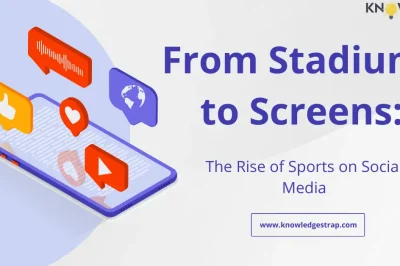Traditionally, an uproarious stadium was the hallmark of sports culture, but today, it has transformed into the arena of social media. From Twitter threads breaking international sports news to Instagram reels showcasing behind-the-scenes moments, sports present an enthralling and vibrant online space. For spectators today, international sporting action has migrated from the stadiums down to the small screens in their palms.
Social media has become the nerve center for any sports spectator. For many decades, this spectator soared in support of his beloved sports team through televised broadcasts, newspapers, and radio. Hardly a minute goes by without fans sharing updates from wherever they are: live highlights, fan interaction, even direct fan-to-athlete interaction. Social media platforms created by history or developed in some corner of contemporary culture-cum-sports now demand our immediate attention, even speaking their minds.
These platforms are not only for updates; they are storytelling platforms as well. They present intriguing stories such as player interviews, locker room moments, and interactive fan polls. All the creative, meme-filled reactions that spark worldwide conversations will flood the social media platforms during international tournament seasons.
So, fans are no longer passive viewers; they have become part of the storyline. One single viral post can create a buzz around a game or favor a player over another, or it can even endorse a certain team. Social media is an unmatched powerhouse with built-in immediacy and reach for today’s sports experience.
Breaking Borders in International Sports
Social media has wiped away many territorial lines for good. The world can now catch the live action of cricket matches in India, football matches in Spain, or even tennis tournaments in Australia through social media. This is what going to the next level really means: putting international sports right in front of the world audience.
Going forward, international sports news will not need any press releases or post-game reports for publication. The breaking of news into immediate presence has now become the domain of sports journalistic organizations as they beam live updates on the platforms’ feeds, making it pliant for fans. Even the players use social media to make their personal announcements—injury, comeback, retirement, or endorsements.
There shall be rights amplification for some lesser-known sports. Events like the Rugby World Cup, Olympic qualifiers, and niche martial arts tournaments gain significant visibility through trending hashtags and viral highlights. Social media has democratized exposure, allowing unsung sports to build international audiences independently, free from the traditional clutches of media entities.
The Role of Artificial Intelligence in Sports Media
The innovation of social media makes AI the major tide behind it. Every technology and application, from creating content recommendation algorithms to generating AI highlights, is revolutionizing the creation and consumption of sports content.
AI in social media helps platforms deliver personalized sports content based on user behavior. When a user frequently visits NBA game highlight clips, an AI engine will prioritize such feeds for this type of viewer, enhancing their personal viewing experience. This boosts engagement by keeping fans connected to their favorite teams and athletes around the clock.
Apart from curation, AI also transforms sports analytics. Advanced machine learning can break down match footage and key plays and predict outcomes. These data are increasingly used by teams and broadcasters to augment coverage so that fans are more informed and engaged.
AI also helps in fighting misinformation and online toxicity — two significant issues of the contemporary fast-moving era of sports news. AI moderation tools fact-check dubious posts and help maintain a healthy environment for online sports fans on social media.
The Athletes as New Digital Influencers
In addition, social media brought forth yet another species of athletes: the “digital” and “influencer” athlete. A player’s online existence today is almost as vital to the person’s recognition as that performance on the field. Star athletes like Cristiano Ronaldo, Serena Williams, and Virat Kohli have gained giant followings online, and all this is comparable to what the mainstream celebrities have.
This influencer status enables them to reach new heights. They can simply endorse products, set up their businesses, and personally build a brand. Real humanization also allows viewers access to the training and family lives of their heroes, as well as their thoughts on mental health and activism.
For instance, they can control their narratives without relying on traditional media. So, the direct link between athletes and their fans has changed the meaning of a sports figure in the digital world.
The Future is Real Time. Interactive, Global
In the long run, social media and sports will deepen into an intersection. While virtual reality experiences will enhance live streaming innovations and AI-generated content will provide some added personalization, this kind of new development becomes a primary resource for broadcasting rather than just a complementary one for younger audiences.
In fact, all evidence shows that sports content is moving toward increased interaction with total immersion in real-time stats overlays, live fan Q&As, and AR filters. Fans will not just watch the game; they will be stakeholders.
Language, thanks to AI-powered translations and subtitles, will become a primary barrier-less wall as global sports get more interconnected. They will feel far closer, more accessible, and more unified than ever.
Final thoughts
Sports have found a perfect second home in social media, from stadiums whose walls shake with the cheers of thousands to the global chorus of voices in a powerful online discussion. The technology of real-time engagement with personal content has transformed the way fans consume and interact with sports. Whether in the form of the most recent news about international sports, the filth of a viral goal celebration, or the strategic use of AI within social media, the digital realm is all-encompassing.






